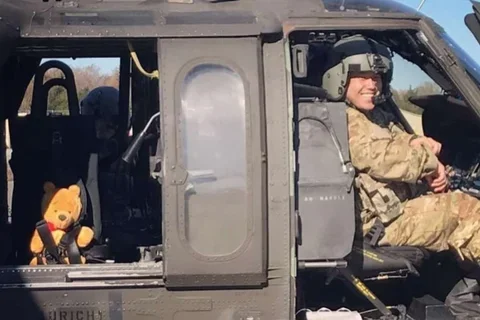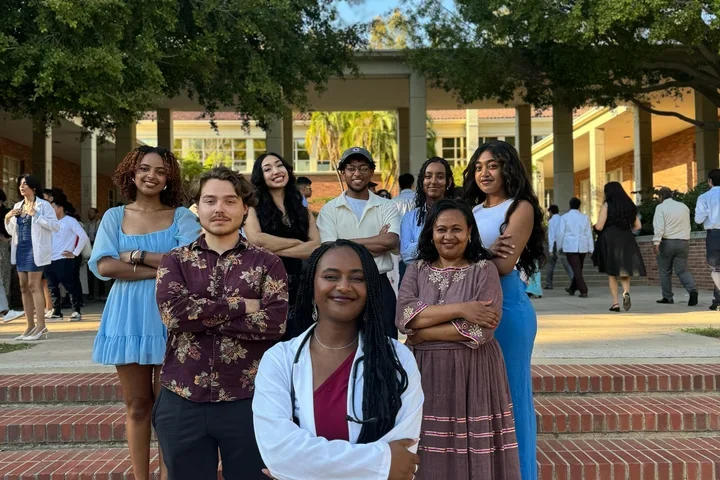Student cherishes similarities between the military and medicine
Timothy Ko was a Black Hawk helicopter pilot in the U.S. Army.

Timothy Ko has long dedicated his life to service.
A former U.S. Army captain and aviation officer, Ko’s eight years of military service instilled in him a deep commitment to selflessness and leadership.
Now, as a first-year medical student at the David Geffen School of Medicine at UCLA, Ko, 34, brings that same purpose to medicine, continuing to improve lives and serve others with compassion.
“I think it always appealed to me — to serve in an organization that was greater than myself,” says Ko, who was the first in his family to join the military. “It was never just about pursuing what I wanted to do but about being part of a team that was always serving a greater cause.
“One of the things I really enjoyed about the military was that it was always about the people and never about my own needs,” he says. “It was always about the service of others. … And so, medicine is like a continuation of that selfless service.”
Bridging military service and medicine
Ko, who grew up in Cerritos, never imagined that he would one day become a doctor.
After earning a degree in engineering management from the U.S. Military Academy at West Point, Ko attended flight school and went on to serve eight years in active duty as a helicopter pilot in the Army.
During his service, Ko completed three overseas tours throughout Central America, Europe and the Middle East — serving in various leadership roles and supporting different mission types such humanitarian aid, disaster relief operations, counterterrorism, and MEDEVAC operations. As a pilot, Ko also facilitated the transportation of medical supplies, health care providers and patients.
One particular mission in Honduras — in which Ko and his crew were called to rapidly transport an injured service member to a hospital 2½ hours away by helicopter — profoundly changed his perspective and ignited in him an interest in medicine.
“It was crazy because within minutes of getting notification, we're up in the air going to rescue the injured service member. … It was very quick, high stress, but it was such an intense state of flow,” Ko recalls.
“From then on, I remember thinking, ‘What is another career or calling that has that same purpose — where it’s not about me but about somebody else?’” he says. “And I found it in being a doctor because it’s a perfect blend of that selfless service, but also, lifelong learning. It really blends what I enjoy about learning about the human body and taps into the leadership skills that I’ve learned while being at the academy and in the Army.”
Embracing gratitude and community
After completing service, Ko earned a postbaccalaureate degree from Columbia University and worked as a neurology researcher at NYU, which ultimately led him to apply to medical school.
Now, Ko is pursuing his goal of becoming an orthopedic surgeon.
In the future, he also hopes to work with the veteran population and use his experience to support the communities he calls home.
Timothy Ko celebrates with guests after the White Coat Ceremony marking his entry into the medical profession. (Photo courtesy of Timothy Ko)
“I've been away from California for about the entirety of my adult life, since I was 18, so I wanted to come back and be close to home and family,” he says. “I also really want to know and learn more about the community that I grew up around in Los Angeles.”
Reflecting on his acceptance to his top-choice medical school, Ko says it still feels surreal. He vividly remembers the moment he received the call during his lunch break at work in New York.
“It was December 20th — I still remember the date. I was in the middle of lunch, between some patient calls, when I saw the phone number and thought, ‘Oh, what is this?’” Ko says. “They asked if I had checked my email, and I said no, I was at work. Then they said, ‘Oh, congratulations.’ I was like, ‘Oh my God!’ I couldn’t believe it.
“I was just screaming,” he explains. “I really didn’t think it would happen. … I never imagined I’d even get the chance to interview at UCLA. And yet, here we are.”
And with the support of the curricular and student affairs offices at DGSOM, Ko says, the UCLA community — particularly the veteran community — has made his transition into medical school seamless.
“The veterans here have been incredibly helpful. They have helped me out a lot throughout the decision-making process,” says Ko. “And in the end, it really came down to the community that I wanted to be a part of — the veterans and fellow classmates that I got to meet here were a huge part of that.”
Moving forward and giving back
Looking back on his journey to medical school, Ko shares some advice with fellow pre-medicine veterans: “Don’t give up.”
“The first two years after getting out of the Army were probably the most challenging times in my life, because (the Army) was such a big part of who I was,” he says. “I had to break out of that and build a new identity … to become a combination of both my veteran self and who I’ve become since then.”
Ko says that mindset continues to guide him in his new chapter. As he gains surgical experience, shadows physicians and collaborates with different care teams at UCLA Health, Ko is continually reminded to approach his journey with gratitude and humility.
“Thank you to my family for always supporting me, my friends for believing in me even when I didn’t believe in myself, my former teammates and soldiers I served alongside, and my mentors for guiding me along the way — bringing me from a young lieutenant who didn’t know much to a medical student who’s still learning every day,” says Ko. “And to all my classmates here, I’m just excited to continue in this journey together.”
Original article on UCLA Health: Student cherishes similarities between the military and medicine



